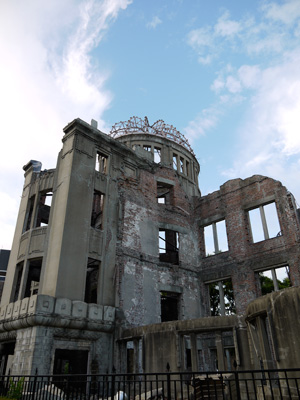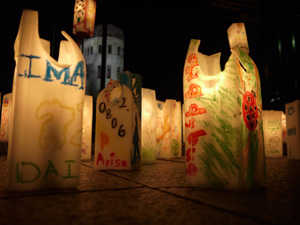| « Environmental show at Hyde Park Art Center | Boy Gets Girl Gets Everything Wrong » |
Culture Tue Jan 22 2013
Letters from Japan: America & Chicago, as Seen from Japan
Editor's Note: This is part of an occasional series of columns from former GB contributor Sheila Burt, who now lives in Japan. "Letters from Japan" will discuss social and urban issues Chicagoans face and how the Japanese do it differently. Previously: Biking in the Countryside and City.
MATSU YAMA, Japan — After more than two years in Japan, I've become a sort of unofficial ambassador for not only my country but also my hometown.
Although my main job here is to teach English, I also view it as my duty to teach others about America. I enjoy breaking down stereotypes and teaching my students about unique aspects of American culture, in particular the diversity of our population and land. In a mountainous country that is 98.5 percent homogenous and roughly the size of California, it comes as a shock to some of my students that walking down a street in a big city, you're likely to encounter Americans of different races, religions and sizes. America's diverse geography and spaciousness also surprises many of my students. The sheer size of my family's middle class house with a backyard elicits a series of ooohhs and ahhhs from my students, and whispers in Japanese that my family must be very rich.
They're also sometimes amazed that I don't eat McDonalds every day, prefer tea over coffee and am slim.
Although certain aspects of American politics make me cringe, I'm usually proud to say that I'm American and am from a multicultural city like Chicago. Most of my students know Chicago by name from the musical or TV shows ("ER," "Prison Break," "The Good Wife"), and Chicago's notorious gang culture even traverses the Pacific Ocean. "Bang bang," they sometimes say, in reference to Al Capone and famous action scenes in movies. Yet almost all of the people I have encountered here are surprised to learn that Chicago is the third largest city in America, a title they think belongs to D.C. or perhaps Boston, and that it's Obama's adult hometown. (Elementary school students love chanting in unison "Yes, we can!" even if they don't understand the meaning).
Being abroad for an extended period of time has made me see so many good things about America and Chicago in particular, yet in my two and a half years here, there have been a few times that I wished I could claim to be from another country, such as Canada, Australia or perhaps New Zealand, breaking down stereotypes about koalas or kiwi instead of answering questions about hamburgers and money.
 The first time that part of me wanted to hide my nationality was when I visited Hiroshima and listened to a hibakusha (an atomic bomb survivor and witness) who spoke of the horror of the day America decided to drop an atomic bomb on civilians, killing thousands and forever sealing the fate of Hiroshima.
The first time that part of me wanted to hide my nationality was when I visited Hiroshima and listened to a hibakusha (an atomic bomb survivor and witness) who spoke of the horror of the day America decided to drop an atomic bomb on civilians, killing thousands and forever sealing the fate of Hiroshima.
The heat from the blast killed her elementary school friend almost instantly and melted the young girl's skin to near liquid form. Although the woman I listened to survived and has lived a relatively healthy life, she was never able to have children of her own, perhaps as a result of the radiation exposure.
When I shook her hand after her speech and looked into her sad, weary eyes, she asked where I was from. I told her America, and she warmly embraced my hand, saying she enjoyed a visit there several years ago. I was glad I took the moment to speak to her in private but contemplated the guilt that comes with knowing I come from a country that uses warfare that often kills innocent civilians (and spends billions of dollars doing so).
 The second time part of me felt shame was in December, in the wake of the Newtown, CT shooting.
The second time part of me felt shame was in December, in the wake of the Newtown, CT shooting.
Instead of answering questions about Christmas and Santa, I spent the week leading up to winter vacation answering questions from my adult students about guns and America. Thankfully, none of my young students seemed to know about the story. "This has nothing to do with Christmas, but can I ask you, Do you have a pistol in your home?," one of my students asked me in class after a light-hearted discussion about holidays in America.
I shook my head no and explained that many families in America want nothing to do with guns, but some Americans strongly view it as their right to possess firearms in their home and to carry concealed weapons in public, even given America's terrible track record with gun violence and the clear danger it brings to citizens.
"Americans love their freedom," another student, a woman in her 50s who lived in America for a short time, noted in our discussion.
I agreed but wondered at what cost.
Japan is not without shameful war history and some horrific crime, including many involving mentally unstable individuals snapping and resorting to violence, sometimes even in a school. But its gun policy couldn't be any further from America's. Japan's gun laws are considered to be some of the most restrictive in the world, and the right to private gun ownership is not guaranteed by law. Civilians can only purchase shotguns and air rifles, and they must prove genuine reason for purchase, as well as pass several grueling exams. (Max Fisher's article in The Atlantic, and his subsequent blog post in the Washington Post, is a must read on this topic). In 2008, there were only 11 deaths from firearms in Japan; in America, there were 12,179.
In one of the most recent incidents involving a mentally unstable individual targeting citizens in public, the perpetrator used a knife. I couldn't manage the horror had he had easy access to a gun.
It's also worth noting that mental health in Japan has been an issue ignored until recently, and suicide rates are terribly high among young men. Although it's extremely sad to see students sometimes suffer through depression without easy access to care, I'm proud to live in a country that has the common sense to strictly regulate access to firearms. It's Japanese tradition to put the safety and needs of society ahead of individual rights; this makes it hard for the Japanese to understand why there are so many murders in a developed country like America.
Guns certainly aren't the only factor in America that should be addressed in the wake of this tragedy and others that happen everyday in inner cities, but to anyone who thinks America's polarizing stance on gun laws isn't part of the problem, I ask them to look at Japan and many other countries around the world.
I'm still proud to be an American, and I encourage all of my Japanese students to visit the United States some day, but I'm hopeful for a day when my country isn't so strongly associated with horrific violence.
This month, at a meeting for an international festival, I helped lead a discussion about America and what games we should play with children to represent America. In between discussions about chocolate chip cookies and football, I helped put together a puzzle of a map of America. After explaining some geography of the states and completing the puzzle, we looked at all 50 states, from Alabama to Wyoming.
"Where is the most peaceful state in America?" a Japanese volunteer, a young man in his 20s who is eager to travel around the world, asked me.
I thought for a moment, before replying, "There isn't."









CB / January 23, 2013 6:54 AM
"...perhaps New Zealand, breaking down stereotypes about koalas or kiwi instead of answering questions about hamburgers and money." Two of my favorite subjects.